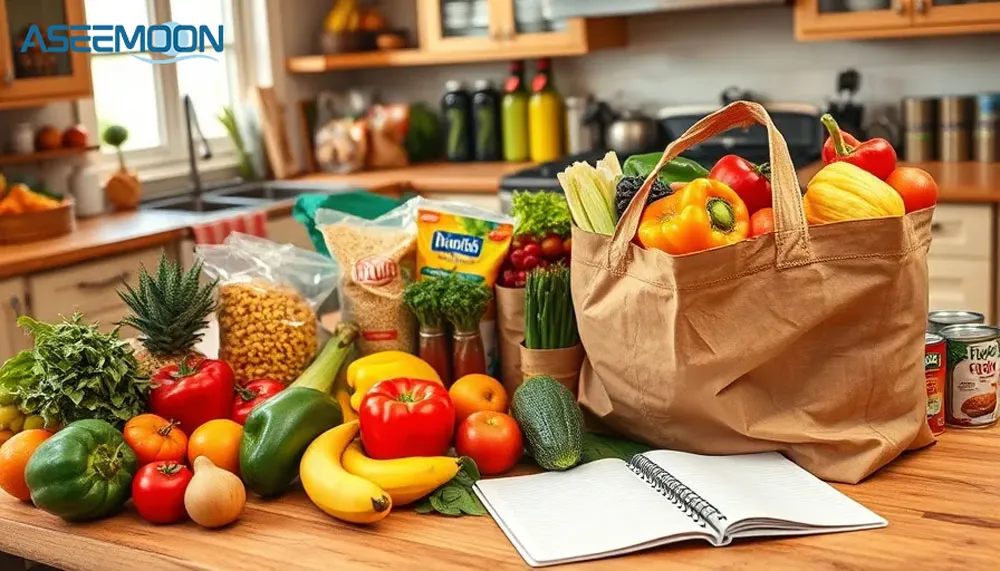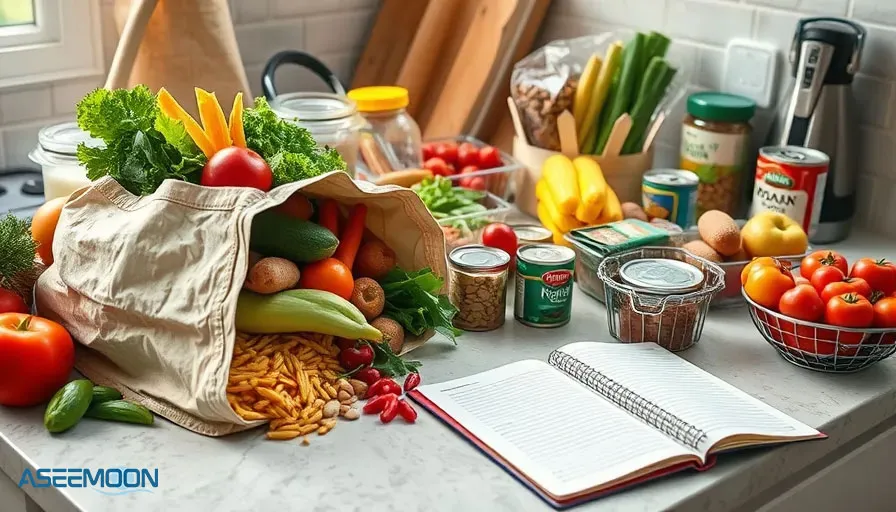How to Save Money on Groceries
To start saving money, you need to know how to save money on groceries. Whether you’re shopping for yourself or a family of five, with strategic planning and mindful shopping habits, you can achieve significant savings regardless of your household size.
Saving money on groceries isn’t just about finding the cheapest items. It’s about learning how to save money on grocery shopping, understanding consumption patterns, and minimizing waste. This article explores various methods, including how to save money on groceries at Walmart, how to save money on meals, and how to save money on food shopping.
For a broader strategy on managing your overall finances, explore our guide on Reducing Household Expenses for actionable tips that go beyond grocery shopping.
Grocery savings aren’t just about finding the cheapest items. They’re about making smart choices in your shopping habits, understanding your consumption patterns, and minimizing waste. This article will explore ways to save on groceries for everyone, from single shoppers to large families, offering practical tips and strategies for everyone. Please stay with Aseemoon.
Understanding Grocery Needs
The first step to grocery savings is understanding what you need. Grocery lists are often cluttered with items we think we might use, but in reality, many of these products go unused and contribute to food waste. Learning how to make a budget-friendly and appealing meal plan can help you focus on essential items and prevent overspending, making sure each item on your list has a purpose.
Assessing Your Household’s Consumption
Understanding your household’s consumption patterns is crucial to avoiding unnecessary purchases. For one person, this could mean evaluating how much fresh produce you use in a week. For a family, this might involve analyzing how often you prepare meals and how quickly you run out of essential items like milk, bread, or cereal.
Tracking Grocery Spending
Keep a detailed record of your grocery expenses over time. By tracking your spending, you’ll get a clearer picture of where your money is going. Using some of the best budgeting apps can make this process easier and more efficient, helping you set a realistic grocery budget and find areas where you can cut costs.
How to Save Money on Groceries for One Person
Shopping for one presents unique challenges, particularly when it comes to food waste. However, with proper planning and smart shopping strategies, singles can make the most of their grocery trips.
Buying in Bulk – Is It Worth It for Singles?
One standard tip for grocery savings is buying in bulk. But is this strategy effective for individuals? In some cases, it can be, especially for non-perishable items like pasta, rice, and canned goods. However, buying perishables in bulk may lead to waste if they aren’t consumed in time. Evaluate the shelf life and how often you use these items before deciding to buy in bulk.
How to Make a Budget-Friendly and Appealing Meal Plan for One Person
Meal planning is a powerful tool for single shoppers. Plan your meals for the week and buy only what you need for those meals. This approach helps prevent overbuying and reduces food waste. Additionally, batch cooking and freezing meals can save time and ensure you always have something healthy on hand, rather than opting for costly takeout or ready-made meals.
9Best Ways to Save Money on Groceries For One Person
Grocery shopping as a single person can be challenging, especially with rising prices. Here are effective strategies to help you save money while ensuring you have enough food without waste.
Plan Your Meals
- Creating a meal plan for the week is essential. This helps you buy only what you need, reducing impulse purchases and food waste. Aim for recipes that use similar ingredients to maximize your purchases and minimize leftovers.
Shop the Bulk Bins
- Utilize bulk bins at grocery stores for items like grains, nuts, and spices. This allows you to buy only what you need, which is particularly useful for single servings. Bulk buying can lead to significant savings and less packaging waste.
Evaluate Your Living Space
- If you have limited storage, get creative with space to stock up on non-perishables during sales. Even small areas can be optimized for additional storage, enabling you to take advantage of bulk deals without overcrowding your kitchen.
Team Up with Friends
- Collaborate with other singles or small households to buy larger quantities of perishable items. This way, you can split costs and avoid waste while benefiting from bulk pricing at stores like Costco.
Stick to a Budget
- Establish a clear grocery budget and track your spending. Keeping a running total as you shop can help prevent overspending and encourage mindful purchases.
Buy Off-Brand Products
- Generic or store-brand products are often just as good as name brands but significantly cheaper. Be open to trying these alternatives to save money without sacrificing quality.
Use Your Freezer Wisely
- Please take advantage of your freezer by buying meats and vegetables in bulk and then portioning them into smaller servings for later use. This strategy not only saves money but also ensures you have ready meals on hand.
Be Mindful of Sales and Coupons
- Look for sales, clearance items, and digital coupons at your local grocery store. If used strategically(+), these can provide substantial savings.
Avoid Shopping Hungry
- Shopping on an empty stomach can lead to impulse buys and unnecessary purchases. Always eat before heading out to the store to help stick to your list(+).
How to Save on Groceries for Families
Grocery shopping can be a significant expense for families, but with strategic planning and smart choices, you can effectively reduce costs. Here are some practical tips to help families save money on groceries.
Grocery Saving Tips for Small Families (2-3 People)
Small families face a different set of challenges when grocery shopping. While you don’t have the large-scale needs of a big family, you still need to ensure that your groceries stretch far enough to feed everyone without going over budget.
Bulk Buying for Small Families
Bulk buying can be beneficial for small families, but it’s’ essential to be selective. Non-perishable items like canned goods, pasta, and rice are ideal for buying in bulk because they can be stored for long periods. However, be cautious when it comes to fresh produce and perishables. While it might be tempting to buy a large bag of potatoes or fruit, only do so if you’re sure it will be consumed before it spoils.
When bulk buying, pay attention to the unit price rather than the overall price. Sometimes, the bulk option isn’t’ necessarily cheaper, so comparing the cost per ounce or pound can help you determine whether it’s’ a good deal.
How to Make a Budget-Friendly and Appealing Meal Plan for Busy Families
Meal prepping can save both time and money for small families. Dedicate one day a week to prepare meals in advance. This way, you can buy ingredients in larger quantities, which often leads to savings. Plus, having meals ready to go during the week can reduce the temptation to order takeout or go for more expensive convenience foods.
When meal prepping, try to create versatile recipes. For example, roasted vegetables can be used as a side dish, in salads, or even in wraps or sandwiches, giving you more options without needing to buy additional ingredients.
Saving Money for Large Families (4-5 People)
Managing an enormous household requires careful planning to keep grocery costs under control. With more mouths to feed, there’s a greater need for strategic shopping and efficient meal planning.
Smart Shopping in Bulk for Big Families
For large families, buying in bulk is often a necessity. Products like flour, sugar, cereal, and frozen foods can be bought in large quantities and stored for extended periods. Shopping at warehouse clubs or stores that specialize in bulk goods can result in substantial savings over time.
However, it’s’ crucial to have adequate storage space for bulk items. Consider investing in extra freezer space or pantry shelving to accommodate larger purchases. Without proper storage, bulk buying can lead to waste, which negates any savings.
Cooking in Batches
Batch cooking is one of the best ways for large families to save on groceries. Preparing large quantities of meals at once, such as casseroles, soups, or pasta dishes, allows you to take advantage of bulk ingredients. Plus, having meals ready to go during the week helps avoid last-minute trips to the grocery store or ordering takeout.
When batch cooking, label, and freeze portions for future use. This not only saves money but also ensures that you have nutritious meals on hand during busy weeks.
10 Best Ways to Save on Groceries for Families
Establish a Monthly Budget
- Determine a realistic grocery budget based on your family’s needs. The USDA recommends a thrifty budget of approximately $976.60 per month for a family of four, while a liberal budget can go up to $1,585.20. Tailor this to your specific family size and dietary needs.
Plan Meals in Advance
- Meal planning is crucial for saving money. By planning meals for the week, you can create a focused shopping list that minimizes impulse buys and reduces food waste. Opt for recipes that use overlapping ingredients to maximize efficiency and savings.
Use Coupons and Loyalty Programs
- Take advantage of store loyalty programs and digital coupons to save on your grocery bills. Many stores offer discounts through their apps or websites, allowing you to access savings before you even step into the store.
Buy in Bulk for Families
- Purchasing non-perishable items in bulk can lead to significant savings. Items like grains, pasta, and canned goods often have lower per-unit prices when bought in larger quantities. Just ensure that your family will consume these items before they expire.
Shop Sales and Clearance Items
- Keep an eye on weekly ads and clearance sections for sales on items you regularly purchase. Stocking up on sale items can help reduce costs over time, especially for staple foods.
Avoid Shopping Hungry
- Shopping while hungry can lead to impulse purchases and unhealthy choices. Always eat a meal or snack before heading out to the grocery store to help stick to your shopping list.
Limit Convenience Foods
- Pre-packaged or convenience foods often come at a premium price. Preparing meals from scratch not only saves money but also allows for healthier options tailored to your family’s preferences.
Utilize Leftovers Wisely
- Plan meals that can be repurposed into new dishes using leftovers, which helps stretch your grocery budget further. For example, roasted chicken can be used in salads, sandwiches, or soups later in the week.
Track Your Spending
- Keep track of your grocery expenses to identify patterns and areas where you can cut back. This will also help ensure that you stay within your established budget.
Consider Store Brands
- Store-brand products are often cheaper than name brands but provide similar quality. Experiment with these alternatives to see which ones your family enjoys.
Saving at Big Retailers: How to Save Money on Groceries at Walmart
Walmart offers many opportunities to save with its price-matching policies, low-cost store brands, and clearance deals. Use Walmart’s app to find in-store discounts and digital coupons. Sticking to a shopping list and avoiding impulse purchases can also help.
Conclusion: How to Save on Groceries
Saving money on groceries is achievable for households of all sizes. Whether you’re a single person looking to cut back on food waste or a family of five trying to manage a large grocery bill, these strategies can help you make the most of your budget. By planning meals, shopping smart, reducing food waste, and taking advantage of sales, you can significantly lower your grocery expenses.
FAQs
What is the best way for one person to save on groceries?
- Key strategies include meal planning and avoiding bulk purchases of perishable items. Shopping with a list and buying only what you need also helps reduce costs.
How can I cut my grocery bill in half?
- Start by meal planning, using coupons, and buying in bulk for non-perishable items. Reducing food waste and shopping during sales are also effective strategies.
Is it cheaper to buy groceries online or in-store?
- It depends on your location, the stores you shop from, and any associated delivery fees. Comparing prices online can help you find the best deals, but watch out for added costs.
How do I reduce food waste in a large family?
- Plan meals carefully, store food properly, and use leftovers creatively. Batch cooking and freezing meals can also help reduce waste.
Are organic products worth the price?
- Organic products can be worth the price for specific items, such as produce from the “”dirty dozen”” list. However, you can save money by selectively buying organic and opting for conventional versions of low-risk produce.
How much can I save by meal planning?
- Meal planning can help you save up to 20-30% on your grocery bill by reducing impulse purchases and food waste.



